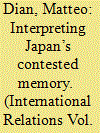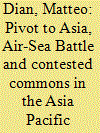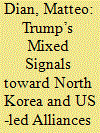| Srl | Item |
| 1 |
ID:
141734


|
|
|
|
|
| Summary/Abstract |
This article applies an interpretive approach to account for the process of definition and contestation over wartime memory in Japan. It first locates the role of memory in interpretive theory, emphasising how beliefs about the past are a crucial component of foreign policy traditions. Second, it highlights how the process of contestation over a country’s memory is fundamentally intertwined with attempts to legitimise or resist key foreign policy decisions in response to contemporaneous dilemmas that force a confrontation with historical traditions. This is illustrated through an analysis of the Yoshida Doctrine’s problematic compromise between conservative and progressive traditions of thought about Japan’s role in the Second World War, beginning with the period of US Occupation, moving through the Cold War years and ending with the death of the Shōwa Emperor in 1989. Finally, it studies the ‘normalisation’ of Japanese foreign policy during the post-Cold War Heisei period, the dilemmas caused by the debate over wartime memory and the effort to achieve reconciliation with other Asian nations. The central argument is that post-war Japanese foreign policy has generally represented an uneasy and evolving compromise between the conservative and progressive traditions.
|
|
|
|
|
|
|
|
|
|
|
|
|
|
|
|
| 2 |
ID:
137213


|
|
|
|
|
| Summary/Abstract |
The Pivot towards the Asia Pacific has been a key component of the grand strategy of the Obama administration. Militarily, the main challenge is represented by the Chinese capacity to erode the American ‘command of the commons’.
The United States have been developing a new operational concept, labelled ‘Air-Sea Battle’ (ASB) aimed at maintaining the capacity to project military power even if adversaries are able to deploy a sophisticated anti-access area denial strategy.
The implementation of ASB is likely induce Beijing to respond with a further acceleration of the process ofmodernisation of its armed forces.
|
|
|
|
|
|
|
|
|
|
|
|
|
|
|
|
| 3 |
ID:
163647


|
|
|
|
|
| Summary/Abstract |
The relationship between the Trump administration and the regime in Pyongyang has gone through two distinct phases: a period of crisis and confrontation, roughly corresponding to the year 2017, and a period of diplomacy and détente in the first half of 2018, which culminated in the Singapore summit of June 2018. During both phases, Trump’s approach has been characterised by a high degree of unpredictability and the use of ‘mixed signals’. As a consequence, while the US achieved a significant objective in 2018, namely a reduction in tension and risk of conflict, this came at a considerable cost, especially in terms of the solidity of the US-led alliances in East Asia.
|
|
|
|
|
|
|
|
|
|
|
|
|
|
|
|
| 4 |
ID:
189253


|
|
|
|
|
| Summary/Abstract |
This article analyses wedge strategies in the context of Russo-Japanese relations. In particular, it looks at how both countries have sought to generate a dis-alignment in the opposing side, preventing further steps toward the consolidation of potentially threatening partnerships: the US-Japan alliance for Russia, and the Russia-China entente for Japan. After identifying the respective goals of Russia and Japan, the article examines the conditions that enable the success of wedge strategies. Looking at the case of Russia-Japan relations from 2012 to 2020, the article argues that a strategy constituted of a mix of positive economic and political incentives and a limited amount of coercion can succeed in producing a degree of dis-alignment in the opposing camp. Russia’s strategy seems to be more productive than Japan’s since Moscow has managed to minimize the effect of sanctions imposed by Japan and it has reduced political differences to mostly bilateral and regional issues. A greater level of cooperation with established partners for both Russia and Japan, and limited costs of wedging strategies, have resulted in dis-alignment but not a reversal of existing alignments. The article also indicates that in this case credibility issues do not fundamentally affect the degree of success of wedge strategies.
|
|
|
|
|
|
|
|
|
|
|
|
|
|
|
|